Table of contents
Introduction
Importance of foundational literacy and numeracy.
Foundational literacy and numeracy mission
Key strategies of foundational literacy and numeracy
How SETU helps in attaining foundational and numeracy skills.
Conclusion
Introduction:
Recent surveys conducted by governmental and non-governmental organizations have sounded an alarm that we are facing a learning crisis. The current state of education is concerning, particularly for elementary school students.
Over five crore young learners lack foundational literacy and numeracy skills, which are fundamental to their academic and personal development. These essential skills encompass reading and comprehending basic text and performing basic addition and subtraction with Indian numerals.
This article explores the importance of foundational literacy and numeracy skills and the critical need for immediate action to address this education emergency.
Foundational Literacy and Numeracy:
Foundational literacy and numeracy are the building blocks of education. These skills are essential for young learners to succeed in their academic journey and improve critical skills, and cognitive abilities. Literacy goes beyond mere reading; it empowers students to comprehend, analyze, and communicate effectively. Numeracy, on the other hand, equips them with basic mathematical skills, which are vital for problem-solving abilities and decision-making in everyday life.
Importance of Foundational Literacy and Numeracy:
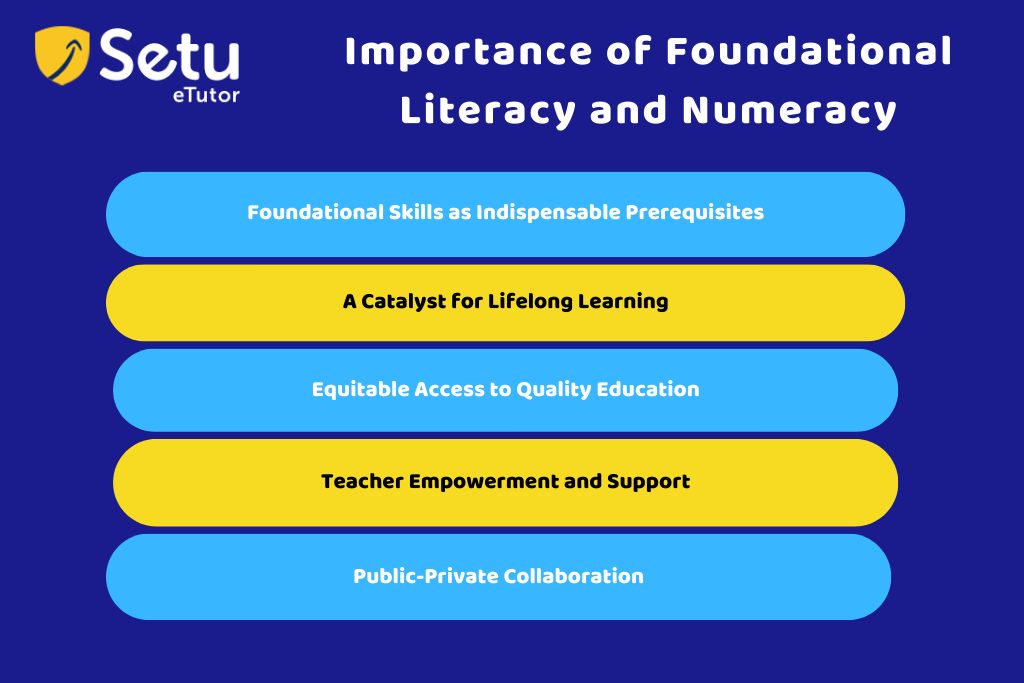
The National Education Policy (NEP) 2020, a transformative blueprint for the future of education in India, emphasizes the significance of foundational literacy and numeracy. The policy recognizes that the ability to read, write, and perform basic mathematical operations is essential for academic success and a fundamental foundation for all future learning endeavors.
The key highlights of NEP 2020 concerning foundational skills and how they can pave the way for a robust and lifelong learning experience are:
- Foundational Skills as Indispensable Prerequisites:
NEP 2020 highlights that foundational literacy and numeracy are non-negotiable prerequisites for a child’s educational journey. The policy acknowledges that these skills form the building blocks upon which a child’s entire educational experience rests. Without a strong foundation in reading and math, students may face difficulties grasping more complex concepts and may experience a persistent learning gap.
- A Catalyst for Lifelong Learning:
The policy recognizes that learning is not limited to the boundaries of formal schooling but extends to the entirety of one’s life. A solid grounding in foundational literacy and numeracy equips individuals with essential cognitive skills, critical thinking abilities, and problem-solving acumen vital for success in various personal and professional pursuits. It fosters a culture of lifelong learning, enabling individuals to adapt to evolving challenges and opportunities in an ever-changing world.
- Equitable Access to Quality Education:
NEP 2020 places a strong emphasis on equity and inclusion in education. By prioritizing foundational skills, the policy aims to ensure that all children have access to quality education regardless of their socioeconomic background or geographical location. This focus on foundational literacy and numeracy can help reduce disparities in learning outcomes and bridge the education divide.
- Teacher Empowerment and Support:
The successful implementation of NEP 2020’s vision relies heavily on the capacity and dedication of teachers. The policy underscores the importance of teacher training and professional development to nurture foundational skills among students effectively. By empowering teachers with innovative pedagogical approaches and adequate resources, NEP 2020 seeks to create a conducive learning environment that promotes excellence in foundational learning.
- Public-Private Collaboration:
NEP 2020 acknowledges that the government cannot solely shoulder the task of nurturing foundational skills. It emphasizes the need for active collaboration between the public and private sectors to mobilize resources, expertise, and innovative solutions to improve the quality of foundational education.
Foundational Literacy and Numeracy Mission:

The New Education Policy (NEP) 2020 underscores the critical importance of foundational literacy and numeracy as fundamental educational prerequisites. Recognizing the urgency of addressing this crucial aspect of learning, NEP 2020 has declared it a national mission.
- Universal Foundational Literacy and Numeracy, A Top Priority:
NEP 2020 places immense importance on Universal Foundational Literacy and Numeracy, recognizing them as the bedrock of a child’s educational journey. It considers these skills paramount for enabling students to comprehend and engage with more advanced concepts as they progress through their schooling.
- Meaningful Reading and Writing by Grade 3:
The policy sets a clear target for learners to achieve meaningful reading and writing abilities by entering grade 3. The NEP aims to empower students to express themselves effectively, comprehend texts, and engage critically with various subjects by building strong language skills.
- Numeracy Competencies by Grade 2:
Equally important is developing basic numeracy competencies among young learners by grade 2. The policy recognizes the significance of understanding and applying numerical concepts early on, as this forms the foundation for more complex mathematical skills in later years.
- Integrating Experiences for Better Learning:
NEP 2020 advocates integrating real-life experiences into classroom learning to enhance foundational literacy and numeracy. By connecting students’ outside school experiences with their academic pursuits, the policy aims to make learning more relevant, meaningful, and enjoyable.
- Teacher Empowerment and Training:
Universal Foundational Literacy and Numeracy’s mission emphasizes teacher empowerment and training. Educators are encouraged to adopt innovative pedagogical approaches, create engaging learning environments, and cater to the diverse needs of learners.
- Monitoring and Evaluation:
NEP 2020 recognizes the need for continuous monitoring and evaluation to track learners’ progress in acquiring foundational literacy and numeracy skills. Regular assessments will help identify areas requiring additional attention and support, ensuring no child is left behind.
SETU an AI-assisted platform supports the child in identifying the learning gaps and provides targeted support.
SETU an AI-assisted platform supports the child in identifying the learning gaps and provides targeted support.
Key strategies of universal foundational literacy and numeracy:
The strategies for promoting universal foundational literacy and numeracy encompass a range of approaches and initiatives that collectively contribute to developing essential reading, writing, and mathematical skills among young learners.
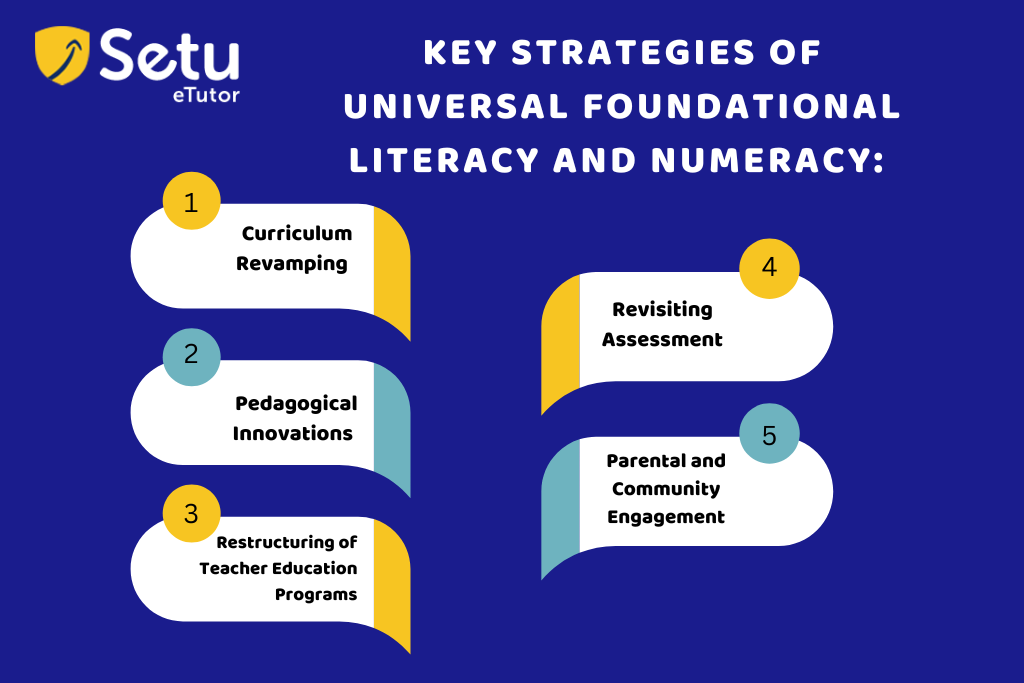
Here are some key strategies:
- Curriculum Revamping
- Pedagogical Innovations
- Restructuring of Teacher Education Programs
- Revisiting Assessment
- Parental and Community Engagement
1. Curriculum Revamping
Revamping the curriculum is indeed a critical step toward promoting foundational literacy among learners in India. To create an innovative and inclusive curriculum, the following initiatives should be taken:
- Development of Contextualized Curriculum: Design a curriculum that reflects the learners’ local context, culture, and language. Contextualizing the curriculum makes learning more relevant and meaningful, fostering a stronger connection between students and their studies.
- Continuum in Preschool and Primary Grade Curriculum: Establish a curriculum continuum with a seamless and progressive transition from preschool to primary grades. This continuity facilitates a smooth learning journey and helps build on previously acquired skills.
- More Space for Children in the Curriculum: Incorporate child-centric and child-led learning approaches to allow students to explore their interests and curiosity actively. Creating space for children’s voices and choices enhances their engagement and ownership of the learning process.
- Development of Multiple Resource Materials: Diversify the range of resource materials used in the curriculum to cater to different learning styles and abilities. Utilize a mix of textbooks, visual aids, hands-on activities, and interactive materials to enhance understanding and retention.
- Development of E-Content: Embrace technology to develop digital learning resources, including e-books, educational apps, and multimedia content. E-content can make learning more accessible, interactive, and appealing to tech-savvy learners.
- Focus on Language Skills: Emphasize language development, as strong language skills are fundamental to literacy. Integrate reading, writing, and communication activities across subjects to strengthen students’ language abilities.
- Investing in Education: Governments must allocate adequate resources to improve the quality of education, focusing on foundational skills and ensuring equitable access to learning opportunities.
2. Pedagogical Innovations
Pedagogical innovations play a crucial role in ensuring learners’ successful attainment of foundational literacy and numeracy skills.
To develop effective classroom processes and interventions tailored to the needs of primary-grade children, the following initiatives can be taken:
- Play-Based Learning: Introduce play-based learning activities that promote active engagement and exploration. Play allows children to learn through hands-on experiences, fostering cognitive, social, and emotional development.
- Inquiry-Based Learning: Encourage inquiry-based learning, where students can ask questions, investigate, and seek answers. This approach nurtures curiosity, critical thinking, and problem-solving skills.
- Interactive and Collaborative Learning: Promote interactive and collaborative learning experiences where students work in groups to discuss and solve problems. Collaborative activities enhance communication, teamwork, and peer learning.
- Use of Visual Aids: Incorporate visual aids, such as charts, diagrams, and multimedia presentations, to enhance comprehension and retention of concepts. Visuals make learning more engaging and accessible to visual learners.
- Storytelling and Narratives: Utilize storytelling and narratives to convey concepts and lessons. Storytelling captures children’s imagination, making learning enjoyable and memorable.
- Differentiated Instruction: Adopt a differentiated approach to instruction, tailoring teaching methods and materials to meet students’ diverse learning needs and abilities. It ensures that all students can grasp foundational concepts effectively.
- Hands-on Activities: Integrate hands-on activities and experiments into lessons to make learning concrete and experiential. Hands-on experiences help students tangibly understand abstract concepts.
- Use of Technology: Integrate educational technology, such as interactive whiteboards, educational apps, and online resources, to enhance teaching and learning experiences. Technology can make learning more dynamic and interactive.
- Formative Assessment Strategies: Implement formative assessment strategies, such as quizzes, games, and class discussions, to gauge student understanding and progress. SETU as a student assistant conducts formative assessments to help teachers identify areas for further reinforcement.
3. Restructuring of Teacher Education Programs
Teacher education programs equip educators with the skills and knowledge necessary to create a conducive learning environment for children, especially in the early grades. To ensure well-prepared teachers’ development, pre-service and in-service programs need to be considered.
Here are the interventions that can be taken in this regard:
- Reconstruction of Existing Pre-service Programs: Revamp existing pre-service teacher education programs to align them with the latest research, best practices, and educational trends. Introduce updated curricula focusing on foundational literacy and numeracy, child development, and effective teaching methodologies for early grades.
- Development of New Pre-service Programs: Design new pre-service teacher education programs specifically tailored to address the needs of early-grade educators. These programs should include specialized courses on early childhood education, foundational skills development, and child-centered teaching approaches.
- Capacity Building Programs for Existing Teachers: Offer capacity-building programs and workshops for in-service teachers to enhance their teaching skills in foundational literacy and numeracy. These programs should address specific challenges teachers face in early-grade classrooms.
- Development of Modules for Teachers: Create comprehensive training modules and resources for teachers focusing on foundational literacy and numeracy. These modules should include practical strategies, instructional techniques, and assessment methods that promote effective learning outcomes for young learners.
- Emphasize Experiential Learning: Incorporate experiential learning opportunities in teacher education programs, allowing teachers to observe and practice effective teaching methods in real classrooms. Hands-on experience enhances their understanding of child development and effective pedagogy.
- Focus on Inclusive Education: Integrate modules on inclusive education into teacher education programs to ensure that educators are equipped to support the diverse learning needs of all students, including those with disabilities and from different cultural backgrounds.
4. Revisiting Assessment
Teacher education programs equip educators with the skills and knowledge necessary to create a conducive learning environment for children, especially in the early grades. To ensure well-prepared teachers’ development, pre-service and in-service programs need to be considered.
Here are the interventions that can be taken in this regard:
- Multiplicity of Assessment Tests and Techniques: Utilize various assessment methods to evaluate different aspects of learning. Besides traditional paper-pencil tests, incorporate performance-based assessments, project work, portfolios, and oral presentations to assess a wide range of skills and abilities. With our technology-driven platform SETU, students can easily improve their learning outcomes through different assessment techniques.
- Development of Model Assessment Tests based on Learning Outcomes: Design model assessment tests aligned with specific learning outcomes. These tests should focus on assessing the foundational literacy and numeracy skills, as well as other critical areas of development for early-grade learners.
- Development of Question Bank: NCERT and SCERTs play a significant role in developing a comprehensive pool of questions related to diverse aspects of foundational literacy and numeracy, tailored for students of various age groups. These questions should align with the specific learning outcomes of each class, ensuring a well-rounded and effective question bank for assessment purposes.
- Creation of Audio-Visual Tools for Assessment: Develop audio-visual assessment tools that can effectively assess listening and speaking skills. These tools may include recorded conversations, oral presentations, and interactive activities to gauge students’ proficiency in language skills.
5. Parental and Community Engagement
- Recruitment of Quality Teachers regularly: Ensure a steady supply of well-qualified and skilled teachers by streamlining the recruitment process. Attracting and retaining quality educators is crucial for delivering effective instruction and nurturing students’ foundational skills.
- Assuring the Health of Children: Prioritize the health and well-being of children, as their physical and mental health significantly impacts their ability to learn. Implement school health programs to address nutrition, immunization, and health check-ups, ensuring children are ready to learn.
- Development of Community Participation: Engage parents, community members, and local stakeholders in the education process. Foster active participation through parent-teacher associations, community meetings, and involvement in school decision-making. Community support enhances the effectiveness of educational initiatives.
- Collaboration with NGOs and Civil Society: Collaborate with non-governmental organizations (NGOs) and civil society groups focusing on education and child development. Partnering with these organizations can bring additional resources, expertise, and innovative solutions to promote foundational literacy and numeracy
Lorem ipsum dolor sit amet, consectetur adipiscing elit. Ut elit tellus, luctus nec ullamcorper mattis, pulvinar dapibus leo.
How Does Setu Help in Attaining Foundational Literacy and Numeracy Skills?

SETU is a powerful and versatile tool for supporting foundational literacy and numeracy by offering digital learning resources, personalized learning experiences, teacher training, parental engagement, and data-driven insights to promote effective learning outcomes for young learners.
- Digital learning resources: Provides access to interactive digital learning resources that enhance foundational literacy and numeracy skills. These resources can make learning engaging and enjoyable for young learners, encouraging them to practice and develop their skills.
- Early Intervention and Remediation: Setu identify struggling learners early and provide targeted interventions and remedial support to help them catch up with their peers. Timely assistance can prevent learning gaps from widening and foster a strong foundation in literacy and numeracy.
- Parental Engagement: Setu involves parents in the learning process by providing them with insights into their child’s progress, strengths, and areas for improvement. It fosters a collaborative approach to education, encouraging parents to support their child’s learning journey.
- Monitoring and Assessment: Setu facilitates continuous monitoring and assessment of students’ foundational literacy and numeracy progress. By analyzing data on student performance, Setu can generate valuable insights to inform educators’ instructional strategies and identify areas where additional support is needed.
- Digital Inclusivity: Setu can help address accessibility challenges by providing digital resources and content in various languages and formats, making learning more inclusive for diverse learners.
- Scalability and Reach: By leveraging technology, Setu can extend its reach to a broader audience, enabling more students to benefit from foundational literacy and numeracy support.
Conclusion
Foundational literacy and numeracy are essential building blocks of education, serving as the bedrock for a child’s future learning and development.
Addressing the learning crisis and ensuring universal attainment of these skills require concerted efforts from governments, non-governmental organizations, educators, parents, and the community.
The recent National Education Policy and other educational initiatives have prioritized foundational literacy and numeracy, making it a national mission. Our platform SETU aligned with NEP 2020, addresses this education emergency and creates a conducive learning environment for young learners, fostering a love for learning and empowering them to succeed in their academic journey and beyond.
To know how the platform benefits your esteemed school, student, or teacher in improving your reading, writing and, mathematical, computing skills, please get in touch with us to schedule a demo now.




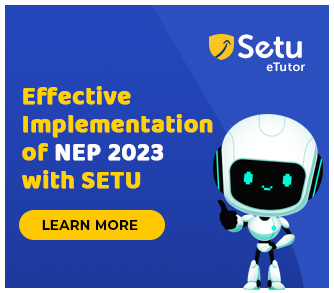
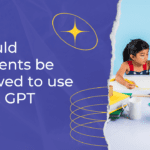
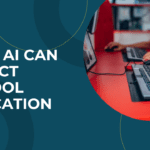
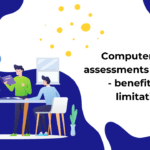
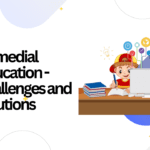
Leave a reply